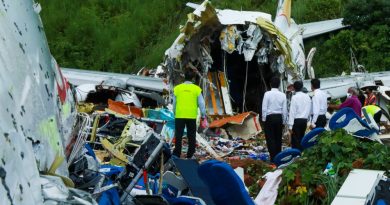This 23-year-old McMaster student wants to see more Indigenous perspectives included in science
Sage Hartmann, a fifth-year McMaster University science student from Red River Métis Nation in Manitoba, is out to centre Indigenous perspectives within the school’s Faculty of Science, something she says there is desire for but not yet enough action on.
“There seems to be a lot of desire for the integration of Indigenous [knowledge],” she said. “[But] there doesn’t seem to be any Indigenous representation or folks knowing how to do so.”
Hartmann organized the university’s World Water Day event with that in mind earlier this week, bringing a day-long program of speakers to introduce more people in the faculty and beyond to Indigenous perspectives and how they intersect with other teachings.
The event was to explore “the relationship that we have to water and the land,” she told CBC Hamilton.
The 23-year-old is majoring in psychology, neuroscience and behaviour with a minor in community engagement and Indigenous studies. She is a citizen of the Manitoba Metis Federation and half-German from her father’s side.
Parallel to her studies, she is also the director of the Cooperative of Indigenous Students, Studies and Alumni at the university and is also a project assistant within the Faculty of Science.
Hartmann proposed to the faculty that she organize a conference with Indigenous and non-Indigenous scholars and scientists about issues related to water, health and the environment.
“I saw an opportunity to bridge Western and Indigenous world views and knowledge in relation to water, environment and sustainability,” she said. “Generally World Water Day is a day where you can take action to talk about water crisis or bring attention to water-related issues, and the way I perceive it, it’s a unique opportunity to centre Indigenous voices,” she said.
Perspectives on water
She said water has always been a topic of conversation within the Indigenous communities and her own life. Access to clean water and sanitation has also been something being talked a lot about in her circles of academia, she said.
This observation helped her choose speakers for Tuesday’s event, who brought different knowledge to the table.
Dr. Nidhi Nagabhatla is a senior fellow with the United Nations University’s Institute on Comparative Regional Integration Studies in Belgium and a sustainability science specialist. She spoke to the McMaster community Tuesday on the topic of global water security, including the insecurity many First Nations communities face with years of boil water advisories.
She cited a multi-million dollar water treatment plant built in 2013 on Six Nations on the Grand River near Brantford — a facility that was built by the government to provide access to clean water but which did not end up serving the community well, she said due to a lack of training and capacity.

Another speaker was Ojibway elder Wendy Phillips, of the Bald Eagle Clan and a member of Wasauksing First Nation near Parry Sound, Ont. She is a ceremonial leader, spiritual educator, cultural innovator and traditional Indigenous healer.
She spoke about Indigenous peoples’ history in Canada, the Indian Act and the residential school system that was designed to assimilate the Indigenous people. “We weren’t considered humans until like 1950s,” she said.
Phillips also spoke about how water has a deep connection with both Earth and people. Water is like blood to the Earth, she said, reminding the audience that, like the human body, the planet is made of mostly of water.
Describing the differences between world views, whether on the environment or language, she said, “with the Western context or ideology, it is very linear, from an Anishinaabe world view, it’s holistic.”
She explored the different meanings of water from her perspective. For instance, according to Indigenous knowledge, she said, tears of joy are said to be good water, while crying in sadness produces salt water and makes eyes puffy and as a result is considered a bad form of water.
Overall, Phillips said, Western society doesn’t value Indigenous knowledge and considers it “lesser than.”
The observation resonates with Hartmann.
“I think it is important to consider how Indigenous people have been living sustainably for generations, for decades and so I think Indigenous people have the knowledge available to help us navigate and come to a solution in regards to the crisis that we are in,” said Hartmann.
The day’s final speaker was Deborah McGregor, an Anishinabek legal scholar, professor at York University and one of the founders of the Decolonizing Water project, which aims to “create a self-sustaining water and ecological monitoring program that will enhance protection of water resources and fulfill the promise of Indigenous water governance.”

McGregor compared Indigenous and Western legal and ethical approaches to water and land.
Humans can become selfish and exploit land and water, she said, but Indigenous ethics teach us to treat them as living beings with respect.
Action plan for the faculty
According to Hartmann, the reason to have both Indigenous and non-Indigenous speakers this week was because it is not only the responsibility of Indigenous people to advocate for the protection of the water, it is also the responsibility of all living on the same land.
With the event drawing in attendees from different parts of the country and seen as a success, Hartmann will continue with her efforts to make change within the Faculty of Science.
Specifically, she’s hoping to continue honouring Indigenous knowledge systems and practices, create Indigenous student support and mentorship programs and help with the recruitment and admission of more Indigenous students into sciences, she said.
Even though she graduates this year, she will continue to work with the faculty, including with helping to incorporate Indigenous knowledge and speakers into future events, she said.
“My plan is to just basically keep doing what I am doing.”

